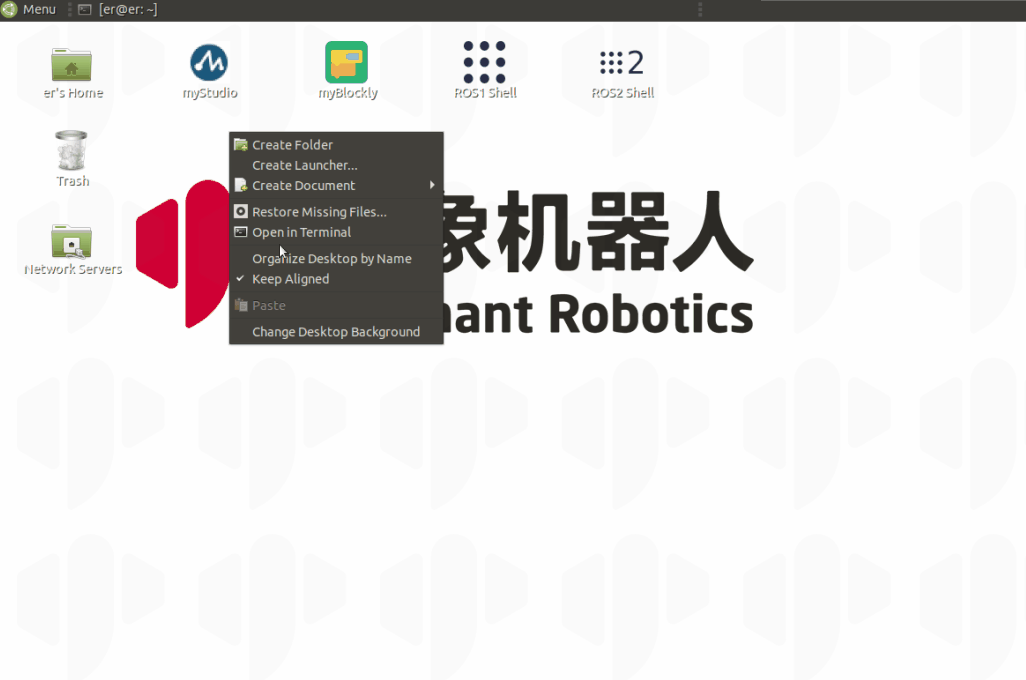TCP/IP
TCP/IP传输协议,即传输控制/网络协议,也叫作网络通讯协议。它是在网络的使用中的最基本的通信协议,对互联网中各部分进行通信的标准和方法进行了规定。用户可以通过机械臂的IP地址连接机械臂,达到无需连接USB端口也可以远程操作机械臂的效果。
myCobot
myCobot RISCV系统远程连接
使用RISCV远程连接时,需要注意以下几点:
- RV4B开发板和控制端需要在同一网络
- 服务器文件(
Server_280_RISCV.py)需要先在RV4B开发板中执行(具体操作见下方gif操作图) - 服务器文件执行后,提示“Binding succeeded” 和 “waiting connect ”表示开启成功,控制端可参考案例进行控制

具体操作为:
克隆我们的项目库:
git clone https://github.com/elephantrobotics/pymycobot.git在demo文件夹中找到 Server_280_RISCV.py 文件
请根据您的机器型号更改Server_280.py文件最后一行MyCobotServer中传递的参数。
默认机型为280RISCV。
默认参数为:
- 串口号:/dev/ttyAMA0
- 波特率:1000000
python 运行:
python Server_280_RISCV.py
案例
在 PC 电脑端运行 Server_280_RISCV.py 脚本:
#!/usr/bin/env python3
# coding:utf-8
import socket
import serial
import time
import logging
import logging.handlers
import re
import fcntl
import struct
import traceback
"""
Instructions for use:
Please update pymycobot to the latest version before use.
`pip install pymycobot --upgrade`
Please change the parameters passed in the last line of the Server.py file, MycobotServer, based on your model.
The default model is the 280 RISCV.
The default parameters are:
serial_num: /dev/ttyAMA0
baud: 1000000
"""
has_return = [0x01, 0x02, 0x03, 0x04, 0x07, 0x08, 0x09, 0x10, 0x11, 0x12, 0x13, 0x14, 0x15, 0x16, 0x17, 0x1A, 0x1B,
0x20, 0x21, 0x22,
0x23, 0x24, 0x25, 0x26, 0x27, 0x28, 0x29, 0x2A, 0x2B, 0x2D, 0x30, 0x31, 0x32, 0x33, 0x35, 0x36, 0x37,
0x38, 0x39, 0x3A,
0x3B, 0x3C, 0x3D, 0X3E, 0x4A, 0x4B, 0x4C, 0x4D, 0x50, 0x51, 0x52, 0x53, 0x54, 0x55, 0x56, 0x57, 0x60,
0x61, 0x62, 0x64, 0x65, 0x66, 0x67, 0x68, 0x69, 0x6A, 0xA0, 0xA1, 0xB0, 0xB1, 0xB2,
0xC0, 0xC1, 0xC2, 0xC3, 0x81, 0x82, 0x83, 0x84, 0x85, 0x86, 0x87, 0x88, 0x89, 0x8A, 0xD4, 0xD5, 0xD6,
0xD7, 0xE1, 0xE2, 0xE3, 0xE4, 0xE5, 0xB0]
def get_logger(name):
logger = logging.getLogger(name)
logger.setLevel(logging.DEBUG)
LOG_FORMAT = "%(asctime)s - %(levelname)s - %(message)s"
# DATE_FORMAT = "%m/%d/%Y %H:%M:%S %p"
formatter = logging.Formatter(LOG_FORMAT)
console = logging.StreamHandler()
console.setFormatter(formatter)
save = logging.handlers.RotatingFileHandler(
"server.log", maxBytes=10485760, backupCount=1)
save.setFormatter(formatter)
logger.addHandler(save)
logger.addHandler(console)
return logger
class MycobotServer(object):
def __init__(self, host, port, serial_num="/dev/ttyAMA0", baud=1000000):
"""Server class
Args:
host: server ip address.
port: server port.
serial_num: serial number of the robot.The default is /dev/ttyAMA0.
baud: baud rate of the serial port.The default is 1000000.
"""
try:
GPIO.setwarnings(False)
except:
pass
self.logger = get_logger("AS")
self.mc = None
self.serial_num = serial_num
self.baud = baud
self.s = socket.socket(socket.AF_INET, socket.SOCK_STREAM)
self.s.bind((host, port))
print("Binding succeeded!")
self.s.listen(1)
self.mc = serial.Serial(self.serial_num, self.baud, timeout=0.1)
self.connect()
def connect(self):
while True:
try:
print("waiting connect!------------------")
conn, addr = self.s.accept()
while True:
try:
print("waiting data--------")
data = conn.recv(1024)
command = []
for v in data:
command.append(v)
if command == []:
print("close disconnect!")
break
if self.mc.isOpen() == False:
self.mc.open()
else:
self.logger.info("get command: {}".format([hex(v) for v in command]))
# command = self.re_data_2(command)
# if command[3] == 170:
# if command[4] == 0:
# GPIO.setmode(GPIO.BCM)
# else:
# GPIO.setmode(GPIO.BOARD)
# elif command[3] == 171:
# if command[5]:
# GPIO.setup(command[4], GPIO.OUT)
# else:
# GPIO.setup(command[4], GPIO.IN)
#
# elif command[3] == 172:
# GPIO.output(command[4], command[5])
#
# elif command[3] == 173:
# res = bytes(GPIO.input(command[4]))
self.write(command)
# if command[3] in has_return:
res = self.read(command)
self.logger.info("return datas: {}".format([hex(v) for v in res]))
conn.sendall(res)
except Exception as e:
self.logger.error(traceback.format_exc())
conn.sendall(str.encode(traceback.format_exc()))
break
except Exception as e:
self.logger.error(traceback.format_exc())
conn.close()
self.mc.close()
def write(self, command):
self.mc.write(command)
self.mc.flush()
def read(self, command):
datas = b""
data_len = -1
k = 0
pre = 0
t = time.time()
wait_time = 0.5
if command[3] in [0x87, 0x54]:
wait_time = 1
while True and time.time() - t < wait_time:
data = self.mc.read()
k += 1
if data_len == 1 and data == b"\xfa":
datas += data
if [i for i in datas] == command:
datas = b''
data_len = -1
k = 0
pre = 0
continue
break
elif len(datas) == 2:
data_len = struct.unpack("b", data)[0]
datas += data
elif len(datas) > 2 and data_len > 0:
datas += data
data_len -= 1
elif data == b"\xfe":
if datas == b"":
datas += data
pre = k
else:
if k - 1 == pre:
datas += data
else:
datas = b"\xfe"
pre = k
else:
datas = b''
return datas
def re_data_2(self, command):
r2 = re.compile(r'[[](.*?)[]]')
data_str = re.findall(r2, command)[0]
data_list = data_str.split(",")
data_list = [int(i) for i in data_list]
return data_list
if __name__ == "__main__":
ifname = "wlan0"
s = socket.socket(socket.AF_INET, socket.SOCK_DGRAM)
HOST = socket.inet_ntoa(fcntl.ioctl(s.fileno(), 0x8915, struct.pack('256s', bytes(ifname, encoding="utf8")))[20:24])
PORT = 9000
print("ip: {} port: {}".format(HOST, PORT))
MycobotServer(HOST, PORT, "/dev/ttyAMA0", 1000000)